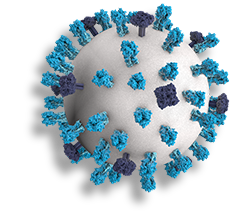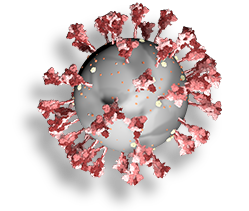
Essential Knowledge to Stay Protected This Season
Choosing Protection, Together
This winter season, take a step towards health awareness by understanding your vaccination options. Vaccines are crucial in protecting against various infectious diseases, including COVID-19 and the flu.
Getting a vaccine can help guard against infectious diseases. It's a simple step to feel safer when you're out enjoying time with others.
For the best advice on whether you should get vaccinated, and which vaccine is right for you, talk to your healthcare professional.
Infectious diseases caused by respiratory viruses like seasonal influenza, SARS-CoV-2 or RSV continue to impact people globally. These pathogens typically spread through close contact, especially when an infected person coughs, sneezes, or speaks, releasing droplets that others can inhale. Environments with poor ventilation or crowding can increase the risk of transmission.1 Additionally, touching surfaces contaminated with viruses and then touching your face can lead to infection. Understanding these transmission methods is key to preventing the spread of various infectious diseases.
These viruses can affect anyone, but specific demographic groups face a heightened risk of severe disease and hospitalization.

Seasonal flu vaccination (“Grippeschutzimpfung”)
The Standing Committee on Vaccination (STIKO) recommends the influenza vaccination2
- for all persons aged 60+
- for all pregnant women from the 2nd trimester, in case of increased health risk due to an underlying condition from the 1st trimester onwards
- for people with an increased health risk due to an underlying condition
- for residents of retirement or nursing homes
- for people who could be a potential source of infection for people living in the same household or for people in need of care

SARS-CoV-2 (COVID-19) vaccination
The Standing Committee on Vaccination (STIKO) recommends the COVID-19 vaccination:3
- for all persons aged 60+ years
- for residents in care facilities
- for all persons aged 6 months or older with an underlying disease (including immunodeficiency)
- for persons of any age with an increased work-related risk of infection in medical and nursing care with direct patient or resident contact
- for family members and close contacts of persons, who are unlikely to achieve a protective immune response through COVID-19 vaccination
- for people with underlying disease with an increased risk of a severe course of COVID-19, for example chronic obstructive pulmonary disease (COPD), chronic cardiovascular, liver and kidney diseases, diabetes mellitus and other metabolic diseases, obesity, disease of central nervous system (CNS), trisomy 21, congenital or acquired immunodeficiency (eg.: HIV) and active neoplastic diseases

Note: Medical staff who have direct contact with patients are also at an elevated risk, given their increased exposure to the virus.4
Talk to your healthcare professional for more information.
Your Protection, Your Choice.
What vaccine types are available?
There are three main kinds of vaccines that you might have heard of: protein-based vaccines, inactivated vaccines, and mRNA vaccines. Viruses often change or mutate, so vaccines are regularly updated to protect against the most common and dangerous variants. This keeps the vaccines effective against these changing viruses.
Protein-based Vaccines
Protein-based vaccines, also known as subunit or conjugate vaccines have been around for decades. These vaccines are still widely used for diseases like hepatitis B, influenza and human papillomavirus (HPV).5,6 More recently, protein-based vaccines have been created to target COVID-19.5 These vaccines use a specific molecule (called an antigen) from the virus or ‘pathogen’, which has been carefully chosen to produce an immune response and create antibodies.7 These vaccines are non-infectious because they do not contain the genetic material the virus needs to replicate inside cells.7,8

mRNA Vaccines
While protein-based vaccines deliver a virus-like protein (antigen) ready-made, directly to the immune system, mRNA vaccines deliver genetic material (created in a laboratory) that instructs the body’s cells to produce the antigen, which in turn triggers an immune response.9,10 mRNA vaccines do not contain any live virus and cannot cause infection.9 Compared with protein-based vaccines, mRNA vaccines are relatively new.11 The first mRNA vaccines to complete all stages of clinical trials and be licensed for use were for COVID-19.12

Whole-cell Inactivated Vaccines
Inactivated vaccines are not live and cannot replicate. These vaccines cannot cause disease, even in an immunodeficient person. Inactivated antigens are less affected by circulating antibody than are live antigens, so they may be given when antibody is present in the blood.13
Inactivated vaccines include whole-cell inactivated vaccines (e.g., polio, hepatitis A, and rabies vaccines), subunit vaccines (e.g., influenza and pneumococcal vaccines), toxoids (e.g., diphtheria and tetanus toxoid), and recombinant vaccines (e.g., hepatitis B, human papillomavirus (HPV), and influenza.13

Ask your doctor for guidance on vaccination this flu season
Ask your doctor for guidance on vaccination this flu season
Stay Informed and Protected
It’s important to stay informed about the latest healthcare guidelines, so that you can stay protected. Always speak to your healthcare professional for advice on what’s best for you.
Yes, getting a flu vaccine and COVID-19 vaccine at the same visit is recommended if you are eligible and the timing for each vaccine is right. This might be more convenient than having two separate visits. There’s no recommended waiting time between getting a flu vaccine and a COVID-19 vaccine.14
Robert-Koch-Institute recommends “an interval of 3 months should be observed after an infection to complete (2nd shot) the basic immunization, or 6 months for a booster vaccination.” (RKI 2023). Always consult a healthcare provider for personal guidance.15
A large proportion of COVID-19 vaccinations are carried out by local general practices, which includes vaccinations administered by doctors at nursing care facilities. Company doctors and local pharmacies can also administer COVID-19 vaccines.16
The Standing Committee on Vaccination (STIKO) recommends immunisation schedule for recommended standard vaccinations. Healthy people aged between 18 and 59 years (including pregnant people) are recommended a basic immunisation as well as a booster to build up a basic immunity. At least two such exposures should occur through vaccination.
Groups of people who are at increased risk are recommended an additional booster vaccination once a year. The vaccination should be administered with a variant-adapted vaccine and generally at least 12 months after the previous vaccination or infection.17
To safeguard against seasonal respiratory diseases, follow the vaccination guidelines provided by local health authorities, including those for COVID-19. The Federal Ministry of Health, for instance, recommends that individuals of various age groups, including children, adolescents, and adults, regularly receive a combination of basic immunization and booster shots.18
Visit Der Corona-Impfcheck for clear recommendations.16
- What are my vaccine options?
- Do vaccines work for everyone? Are vaccines effective for everyone?
- If I already had COVID-19 and recovered, do I still need to get a COVID-19 vaccine?
- Can I get my COVID-19 and flu vaccines at the same time?
- If I am immunocompromised and/or 65 years and older, are there any precautions I should consider before choosing a COVID vaccine?
Ask your healthcare professional about staying protected.
1 European Centre for Disease Prevention and Control (ECDC). COVID-19. Available at: www.ecdc.europa.eu/en/covid-19 [Accessed: November 2023]
2 Robert-Koch-Institut (2023): Antworten auf häufig gestellte Fragen zur Schutzimpfung gegen Influenza. Available at: RKI - Influenza - Antworten auf häufig gestellte Fragen zur Schutzimpfung gegen Influenza [Accessed: November 2023).
3 Robert Koch Institute. Epidemiologisches Bulletin 21/2023. Available at: https://www.rki.de/DE/Content/Infekt/
4 National Center for Biotechnology Information (NCBI). Transmission of SARS-CoV-2: A Review of Viral, Host, and Environmental Factors. Available at: www.ncbi.nlm.nih.gov/pmc/articles/
5 Marchese AM, et al. Vaccine. 2022;40:6567–6569.
6 How Vaccines Work. Public Health 2023. Available at https://www.publichealth.org/public-awareness/understanding-vaccines/vaccines-work/ [Accessed 7 Sept 2021].
7 Vaccine Types. NIH 2019. Available at https://www.niaid.nih.gov/research/vaccine-types [Accessed 7 Sept 2021].
8 Nascimento IP, Leite LCC. Braz J Med Biol Res. 2012;45:1102–1111.
9 Understanding How COVID-19 Vaccines Work. https://www.cdc.gov/coronavirus/2019-ncov/vaccines/different-vaccines/how-they-work.html#:~:text=To trigger an immune response,immune response inside our bodies. [Accessed 27 September]
10 Advances in COVID-19 mRNA vaccine development. https://www.ncbi.nlm.nih.gov/pmc/articles/
11 The Long History of mRNA Vaccines. Johns Hopkins Bloomberg School of Public Health 2021. https://publichealth.jhu.edu/2021/the-long-history-of-mrna-vaccines#:~:text=There's a big gap between,tested in humans in 2013. [Accessed 7 Sept 2021].
12 Five Things You Need to Know About: mRNA Vaccine Safety. European Commission 2020. https://ec.europa.eu/research-and-innovation/en/horizon-magazine/five-things-you-need-know-about-mrna-vaccine-safety [Accessed 7 Sept 2021
13 Source: Centers for Disease Control and Prevention. Principles of Vaccination. Available at: https://www.cdc.gov/vaccines/pubs/
14 Centers for Disease Control and Prevention. Flu and other recommended vaccines coadministration. Available at: https://www.cdc.gov/flu/prevent/
15 Robert-Koch-Institut (2023). Wie sollen Personen geimpft werden, die bereits eine SARS-CoV-2-Infektion durchgemacht haben? Available at: RKI - Navigation - Wie sollen Personen geimpft werden, die bereits eine SARS-CoV-2-Infektion durchgemacht haben? [Last accessed: November 2023]
16 BZgA. Der Corona-Impfcheck. Available at: www.infektionsschutz.de/coronavirus/
17 Federal Ministry of Health: Information on Coronavirus vaccination. Available at: https://www.bundesgesundheitsministerium.
18 STIKO. STIKO-Empfehlung zur COVID-19-Impfung. Available at: www.rki.de/DE/Content/Infekt/Impfen/



